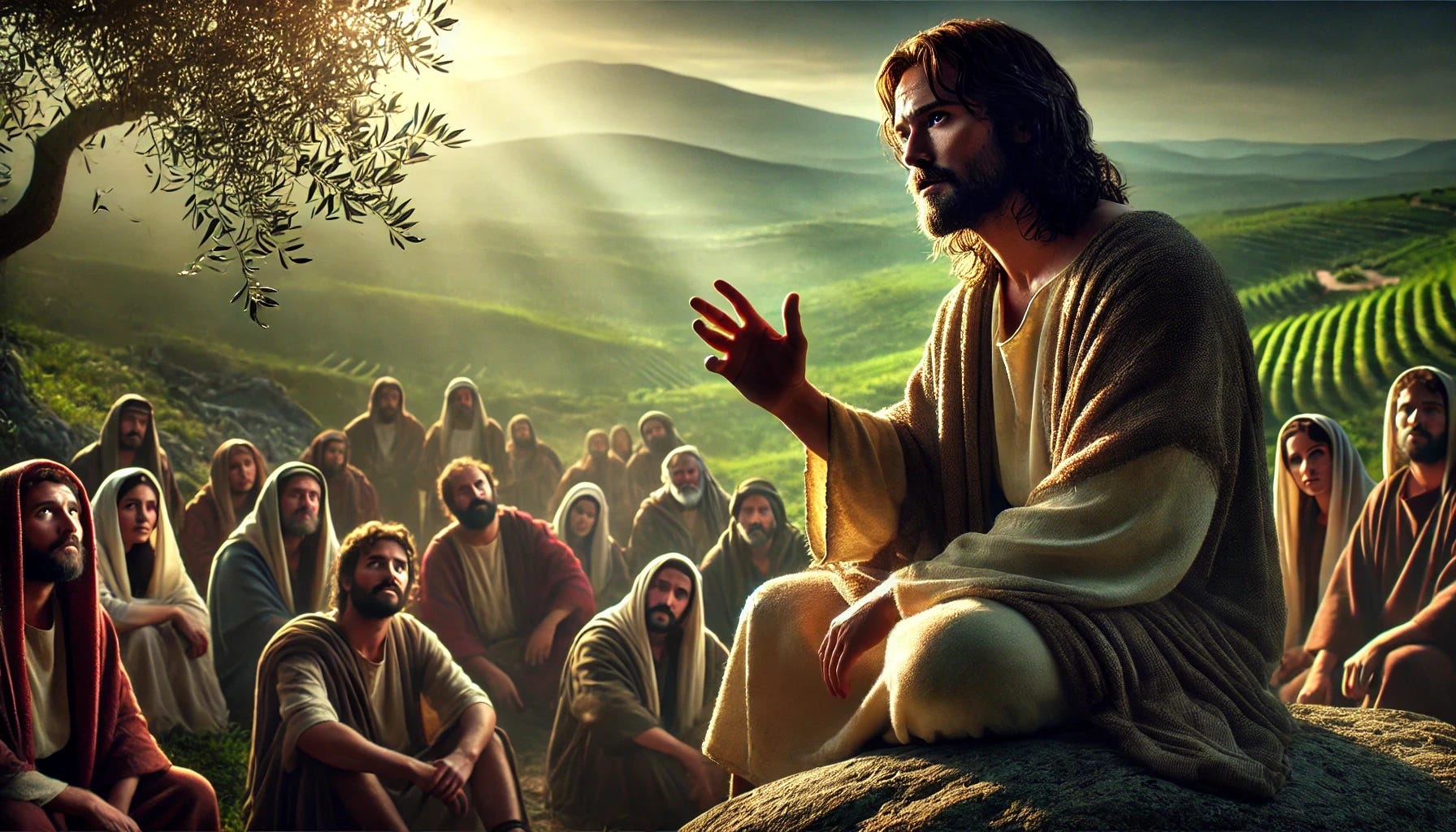“God be merciful to me, a sinner!”
Homily for the Saturday of the 3rd week in Lent, Daily TV Mass
“Jesus relates the Parable of the Pharisee and the Tax Collector”, AI-Generated/Dall.E, credit to: National Catholic Broadcasting Council
For I desire steadfast love and not sacrifice . . . (Hosea 6:6)
The Parable of the Pharisee & the Tax Collector
In today’s Gospel we find Our Lord on His journey to Jerusalem, as He tells His listeners the Parable of the Pharisee and the tax collector. His words are directed to those who presume to be righteous before God, while treating others with contempt.
Jesus describes a Pharisee, who although outwardly very observant with regard to his religious beliefs and practices, is at the same time, self-righteous and spiritually proud. What the Pharisee doesn’t realize, is that because of this attitude, he is really keeping God at a distance.
Jesus goes on to describe a tax-collector, who is genuinely humble and contrite of heart. Unlike the Pharisee, the tax collector acknowledges his sinfulness, and in a spirit of genuine humility calls out to God with a sincere and repentant heart. Indeed, standing off at a distance, and without even daring to look up to heaven, he prays using the very simple words:
God be merciful to me, a sinner! (Luke 18:13)
Here we should bear in mind that in Our Lord’s time, tax collectors were regarded as outcasts because of their corrupt ways. Indeed, elsewhere in the Gospels, Jesus is rebuked by the Pharisees precisely for dining with tax collectors and sinners and for associating with them.
And yet it is the tax collector, the social outcast, and not the self-righteous religious expert, who demonstrates the proper attitude, as he humbly begs for God’s mercy.
“I will put my law within them, and I will write it on their hearts.” Jeremiah 31:33
In Matthew’s Gospel, Jesus states clearly that:
For I tell you, unless your righteousness exceeds that of the scribes and Pharisees, you will never enter the Kingdom of Heaven. (5:20)
Ultimately, if we study the Gospels carefully, we see how Jesus is calling us to ‘interiorize’ the intention of the commandments that were written upon stone tablets.
Far beyond tablets of stone, God says to the prophet Jeremiah:
I will put my law within them, and I will write it on their hearts.
Jesus instructs His followers to look beyond the importance of meeting the demands of ritual purity by having clean hands, to the inner necessity of striving to live with a pure heart.
Yes, our faith teaches us that it is necessary to go to Church and to worship God properly, but ultimately, we are called to become living Temples of the Holy Spirit. In his 1st Letter to the Corinthians, St. Paul asks:
Do you not know that your body is a temple of the Holy Spirit within you, which you have from God? You are not your own. (1 Cor. 6:19)
“Worshiping God”, AI-Generated/Dall.E, credit to: National Catholic Broadcasting Council
On the Journey to the New Jerusalem: Living the Life of Holiness
In the Book of Revelation, St. John reminds us of the great importance of striving to live the life of holiness. His description of the arrival of a new heaven and a new earth, show us that we need to prepare now, every day to enter into the new creation, the New Jerusalem, the Heavenly City that will descend from God at the end of time. In it, St. John sees no temple, for the living presence of God and the Lamb will be the Temple (Rev. 21:22), and God’s faithful servants will worship God and will see Him “face to face.” (Rev. 22:4-5)
Finally, Our Lord’s words in today’s Gospel lead us to reflect upon the mystery of God’s mercy. When we look at the Old Testament, God shows forth His mercy through His great saving actions, the glorious “signs and wonders” spoken of in the Book of Exodus. God’s mercy also shows itself very consistently in His forgiveness of all who are in need of His mercy.
This is such an important and relevant message in our own time, when we have witnessed the rise of tragically mistaken notions of mercy in the case of euthanasia, also known as “medical assistance in dying” (MAiD). The practice ignores the infinite value of every human life, while giving expression to a false sense of mercy and compassion, in the face of the mystery of human suffering.
Let us pray during this season of Lent for the grace to leave behind whatever separates us from God, and from those internal attitudes that keep us from a deeper relationship with God and with one another.
And let us pray that we may always be channels of God’s mercy as we reflect and extend to others the light, love and mercy that God has for all people.
John the Baptist in the Desert: “Prepare the Way of the Lord”, AI-Generated/Dall.E, credit to: National Catholic Broadcasting Council
During this season of Lent, the voice of St. John the Baptist calls out to us from the wilderness to repent and to “Prepare the way of the Lord.” (Isaiah 40:3)
I invite you to view the National Catholic Broadcasting Council’s Daily TV Mass below. The Homily begins at: 6:58.






